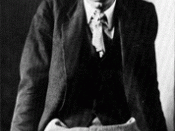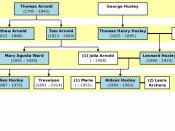�PAGE �9�
Although many different cultures experience different religious affiliations and beliefs, every culture has religion. Religion can be seen as a product of a society or, likewise, the society could seem to be a product of its religion. Religion stands not only at the cornerstone of human society, but also at the heart of the satire of Brave New World.
The religions that are included in this satire are, in actuality, all world religions. Aldous Huxley is constantly comparing both Western and Eastern religions, such as Christianity, Judaism, Islam, Buddhism, and other monotheistic and polytheistic religions, with the synthetic religions that are found in the book, although the focus of the comparison involves Judeo-Christian beliefs. The reason for this comparison is to parody the real religions with the synthetic religion that Huxley is conveying in his Brave New World.
In this novel, Aldous Huxley challenges the readers' traditional beliefs, showing two entirely new religions that at times seem perfect, and that at other times seem fatally flawed.
Beliefs that are questioned are those about the fundamental nature and characteristics of a religion, the function of prayer, the eternal quest for happiness, our notion of free will, and also the belief concerning the use of a religion as a device for comfort. The two religions that are new to the readers are the religious consumption and artificial and false enlightenment of the "Brave New World" and its counterpart, the ancient and savage Christianity, mutated to include in its belief structure an American Indian tradition of self-flagellation as well as pagan ritual. Huxley is trying to speak of the ills of religions, but not denounce them completely. Instead of having one perfect or "right" religion, he is trying to get the point across that religions serve a common purpose.


